Over the previous few years, there have been fairly a couple of modifications to how key phrases work on the Google Advertisements platform. Whether or not it was the addition (and subsequent elimination) of the modified broad match kind, the introduction of shut variants for actual match, or the shift in how phrase matching will apply, there’s continuously one thing new taking place that causes Search campaigns to carry out in a different way than they used to.
Lately, Google made another query matching announcement that we advertisers might want to alter for. There are two important parts to this announcement that I wish to run via. Let’s go in the identical order Google did.
Contents
Adjustments to model inclusion and exclusion lists
Regardless of some modifications to brand Inclusion and exclusion options throughout completely different marketing campaign varieties, Google was nonetheless listening to the necessity for additional controls.
💡 May your Google Advertisements account profit from attempting broad match key phrases or model lists? Get an on the spot learn in your account efficiency, and uncover optimization concepts, with our Free Google Ads Grader!
Model inclusion lists for broad match
The primary change will affect model inclusion lists for broad match campaigns and key phrases. Model key phrases are extremely precious phrases and may be very particular, whereas broad match tends to leap the shark and match to irrelevant queries at occasions. That implies that with out model inclusion lists, you would possibly see your model key phrases match to queries which can be decidedly not “model” centered.
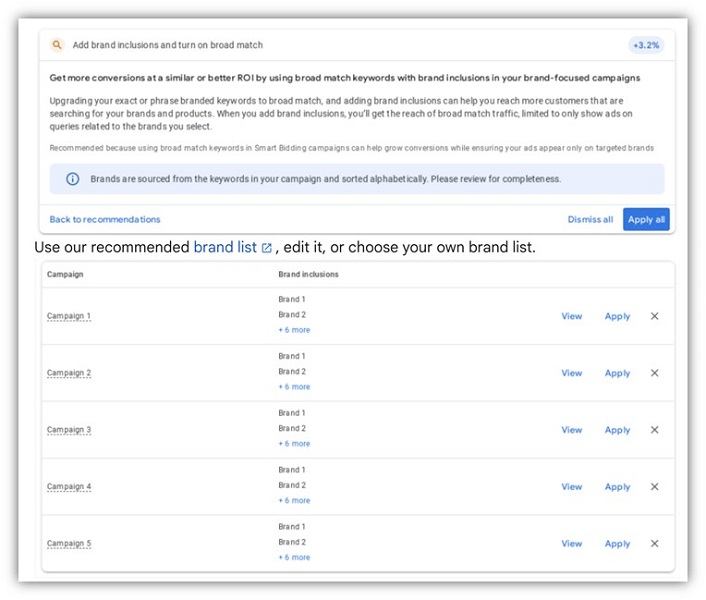
With this modification, Google will make recommendations instantly within the suggestions tab for which model inclusion lists you need to apply to a marketing campaign to retain higher model management.
One BIG caveat to this modification is within the subsequent paragraph: “By making use of this Suggestion, you’ll activate the broad match marketing campaign setting in your campaigns.”
Right here’s a fast view of what that appears like in an current marketing campaign.
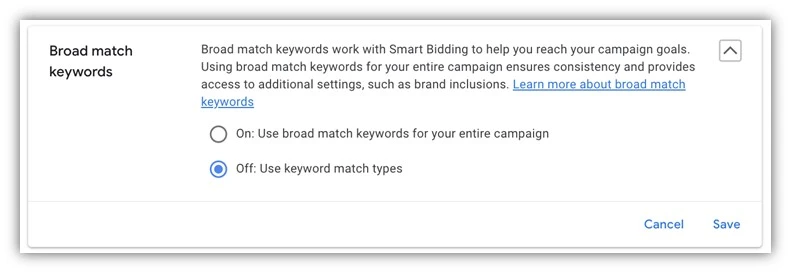

Right here’s what it does: it modifications ALL of your current key phrases to broad match phrases, then makes use of Google’s matching prioritization to find out what to point out for. Granted, it does say that is solely out there with sensible bidding, which, in my expertise, is one of the simplest ways to make use of broad match.
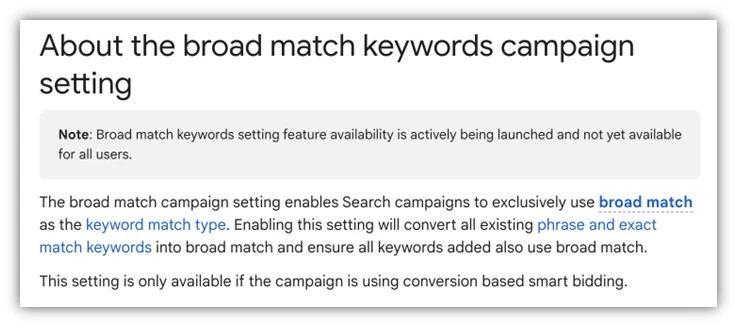

But in addition, in case you don’t wish to leverage broad match key phrases in your marketing campaign, this may not be the very best alternative to leap on.
Model exclusion lists for all match varieties and dynamic search adverts
The second new change for brand keyword bidding is on the other finish: exclusion. Google has had brand exclusion lists for Performance Max campaigns for some time now, serving to advertisers hold PMAX from cannibalizing their branded search question visitors for some time now.
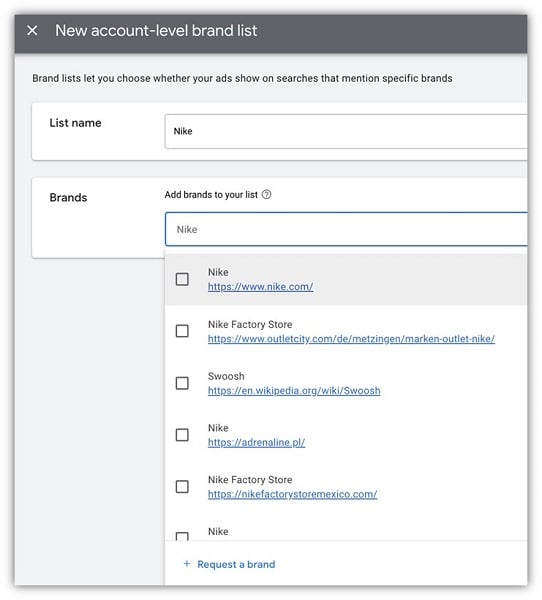

With this modification, Google now’s rolling out model exclusion lists to all match varieties and Dynamic Search Ads campaigns, offering much more management over which manufacturers you exclude out of your campaigns.


To me, this looks like a simple win and sure will solely affect these of us who’ve a tough time segmenting their model versus one other. If you end up in that state of affairs, go forward and provides these model exclusion lists and try to see in the event that they show you how to keep away from these undesirable queries.
Updates to Google Advertisements question matching for misspellings
Misspelled phrases are simply a part of being human and on the subject of search phrases, there’s been a historical past of various approaches to take care of them. Advertisers used so as to add all types of misspelled key phrases, particularly incorrect variations of name phrases, to their campaigns to make sure full protection. Then over time, these misspellings discovered their means in by way of close variant matching.
In Google’s announcement, there are two issues that may affect misspellings. The primary is modifications to the search phrases reporting for misspelled queries in order that advertisers can now see knowledge from these phrases. The second is {that a} misspelled variation of a time period may even be utilized to the core damaging key phrase time period—saving advertisers time spent on including these misspelled phrases as further negative keywords.
🔍 Need new concepts for key phrases and damaging key phrases full with key phrase competitors and value knowledge? Attempt our Free Keyword Tool!
Improved visibility for misspellings
Prior to now, when reviewing your Google Advertisements search phrases report, all misspellings of a phrase would have been categorized as “Different” as they didn’t meet the privateness threshold for reporting.
Transferring ahead, these will now be grouped underneath the right spelling of the key phrase. There received’t be new line objects, however the knowledge from the misspellings will likely be grouped collectively.
The affect will likely be, as Google says, a couple of 9% enhance in quantity being attributed to your correctly spelled search queries and faraway from the “Different” class. In my e-book, this can be a win even when it’s not a 100% totally clear system.
Improved misspelling matches for damaging key phrases
In contrast to your focused key phrases, till now, damaging key phrases ONLY utilized to the very same spelling that you simply had in your damaging key phrases. That meant that to dam misspellings, you would need to make a journey again to the methods of 2010 and add each single misspelled variant of your key phrases to eliminate them.
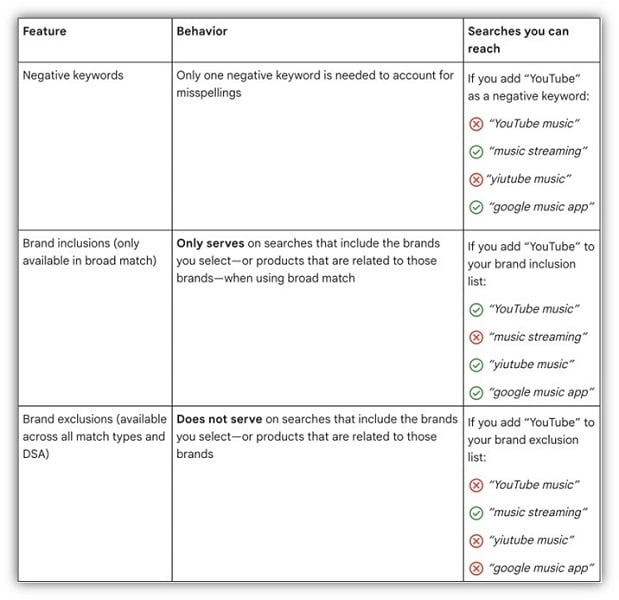

With this modification, Google now’s going to use that very same misspelling enlargement to damaging key phrases as nicely. Within the desk above, the primary line is the very best instance of this. You possibly can see that by including “youtube” as a damaging key phrase, it would now apply to the misspelled model of the question as nicely.
The following strains give perception into how model inclusion and exclusion lists work in distinction to damaging key phrases in case you want a refresher.
General, I’m an enormous fan of this modification. In my expertise, misspellings are sometimes a a lot decrease quantity section, however is usually a actual ache in case you’re attempting to manage prices and hold click on high quality excessive. It is a welcome change for me in my accounts and sure will assist me keep away from having fairly so many negatives in a couple of accounts the place key phrases are extra complicated and hard to get proper.
Key takeaways from the newest Google Advertisements question matching bulletins
As Google’s machine studying continues to broaden and develop, they’ll proceed making modifications like this to how the platform works. Ideally, they’re all the time going to make modifications we like. But when they don’t, we nonetheless want to remain on prime of the modifications, perceive how they work, so we will hold our accounts and our consumer accounts in the very best place to see outcomes.
Let these newest Google Advertisements question matching updates be a reminder to often reevaluate your PPC keyword targeting strategies. When you’re able to uncover extra methods to make the most of the newest Google Advertisements updates as they roll out, see how our solutions may also help you optimize your campaigns and maximize your search adverts outcomes!
